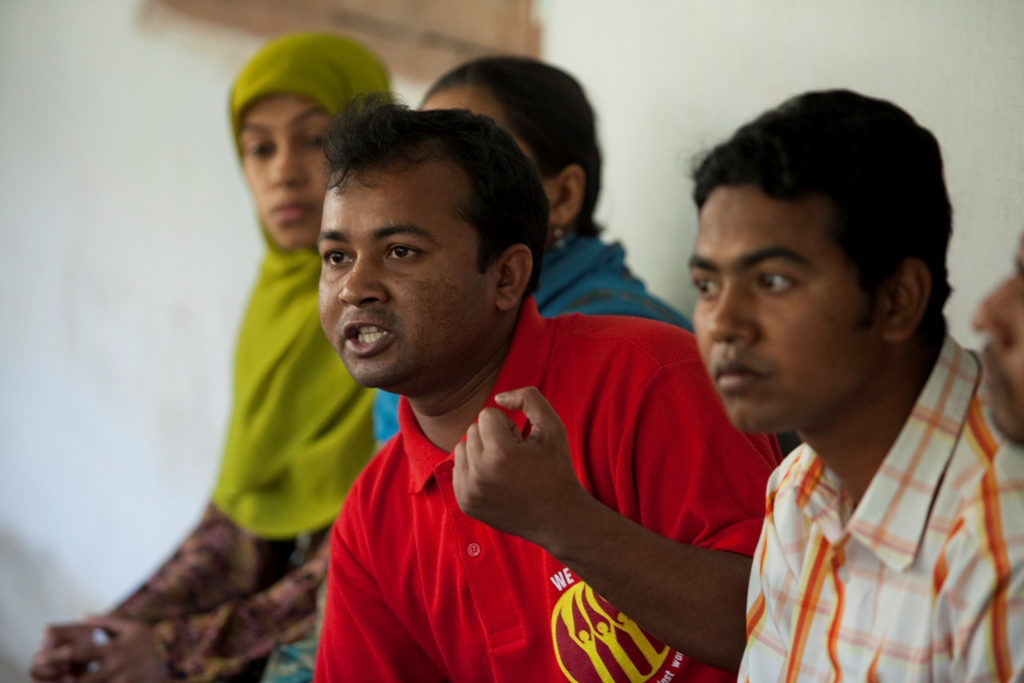Amrai Pari Paribarik Nirjaton Protirodh Jot (WE CAN)
Know Us
 Amrai Pari (We Can) believes that people help other people change their perceptions and practices. People often inspire one another, learn from one another, and many a time begin the process of collective action. Such processes have the power to alter personal behaviour and inter-personal relationships. The campaign, hence, works through millions of Change Makers – men and women who actively encourage more positive attitudes and behaviour towards women within the communities they live and work by providing alternative norms – to facilitate attitudinal change on violence against women. Change Makers are involved in the ‘awareness-to-action’ process both as individuals and as a group. They recognise that change can be stimulated but not forced. Their role is, thus, to stimulate thinking, promote alternatives to violence, personally role-model alternative behaviours, encourage others to share their views, and support women experiencing violence. They do not act on other’s behalf or impose actions but help women experiencing violence to find their own solutions and make their own choices. Change Makers are, in fact, encouraged to identify the violence and discrimination in their own lives, accept their own responsibilities in relation to it, and find their own ways to address it.
Amrai Pari (We Can) believes that people help other people change their perceptions and practices. People often inspire one another, learn from one another, and many a time begin the process of collective action. Such processes have the power to alter personal behaviour and inter-personal relationships. The campaign, hence, works through millions of Change Makers – men and women who actively encourage more positive attitudes and behaviour towards women within the communities they live and work by providing alternative norms – to facilitate attitudinal change on violence against women. Change Makers are involved in the ‘awareness-to-action’ process both as individuals and as a group. They recognise that change can be stimulated but not forced. Their role is, thus, to stimulate thinking, promote alternatives to violence, personally role-model alternative behaviours, encourage others to share their views, and support women experiencing violence. They do not act on other’s behalf or impose actions but help women experiencing violence to find their own solutions and make their own choices. Change Makers are, in fact, encouraged to identify the violence and discrimination in their own lives, accept their own responsibilities in relation to it, and find their own ways to address it.
Currently there are over 2.7 million Change Makers.
WE CAN Alliance, Bangladesh is built on the premise that people change - and that people can change people. It does not prescribe actions, but offers people an idea - that violence against women is not normal, not acceptable and must end. Working through this change making process, WE CAN Alliance, Bangladesh has reached out to 1 million of ‘Change Makers’ across the country so far.
‘Change Maker’ is a voluntary identity. Any person can become a ‘Change Maker’, who believes in the existence of violence and discrimination against women in the family and society; then takes a concrete stand to end that.
In 2009, WE CAN Alliance, Bangladesh initiated the concept of Connector Change Maker. Connector change makers take more responsibilities onto themselves and act as the link between the allies on one level, and other change makers, on the other. Once change makers are successful in achieving their personal goals and show the capacity to go beyond the personal, they are encouraged to become connector change makers, who will act as catalysts to sustain the change of existing change makers. Currently, there are 10,000 connector change makers.
A number of committees are formed at different levels (including Ward, Union and Upazilla levels) by the change makers involved with WE CAN Alliance, Bangladesh. These committees enable change makers to feel that they are not working in isolation in their locality but in groups. In this way, they are more encouraged and perform better. The committees organise events, meetings, and coordinate with the district alliances. Currently there are 3000 Ward committees, 576 Union committees and 126 Upazilla committees.
About Us
Amrai Pari Paribarik Nirjaton Protirodh Jot (WE CAN) is a collective platform of civil society, organizations, individuals, institutions and others aim of ending violence against women.
Keep In Touch
Amrai Pari (WE CAN) Secretariat
6/4 A, Sir Sayed Road (2nd Floor)
Mohammadpur, Dhaka-1207 Bangladesh
Tel: +88 02 41023217
E-mail: [email protected]
Web: www.wecan-bd.org
Copyright © 2018 All Rights Reserved By We Can Bangladesh
About Us
Amrai Pari Paribarik Nirjaton protirodh Jot (WE CAN) is a collective platform of civil society, organizations, individuals, institutions and others aim of ending violence against women.
Keep In Touch
Amrai Pari (WE CAN) Secretariat
6/4 A, Sir Sayed Road (2nd Floor)
Mohammadpur, Dhaka-1207 Bangladesh
Tel: +88 02 41023217
E-mail: [email protected]
Web: www.wecan-bd.org
Copyright © 2018 All Rights Reserved By We Can Bangladesh
